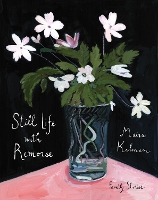


|
|
|
books
| book details |
Still Life with Remorse
By (author) Maira Kalman

|
| on special |
normal price: R 775,95
Price: R 697,95
|
| book description |
From the critically acclaimed artist, designer, and author of the bestsellers The Principles of Uncertainty, My Favorite Things, and Women Holding Things comes a moving meditation in words and pictures on remorse, joy, ancestry, and memory. Maira Kalman’s most autobiographical and intimate work to date, Still Life with Remorse is a beautiful, four-color collection combining deeply personal stories and 50 striking full-color paintings in the vein of her and Alex Kalman’s acclaimed Women Holding Things. Tracing her family’s story from her grandfather’s birth in Belarus and emigration to Tel Aviv—where she was born—Maira considers her unique family history, illuminating the complex relationship between recollection, regret, happiness, and heritage. The vibrant original art accompanying these autobiographical pieces are mostly still lifes and interiors which serve as counterpoints to her powerful words. In addition to vignettes exploring her Israeli and Jewish roots, Kalman includes short stories about other great artists, writers, and composers, including Leo Tolstoy, Franz Kafka, Gustav Mahler, and Robert Schumann. Through these narratives, Kalman uses her signature wit and tenderness to reveal how family history plays an influential role in all of our work, lives, and perspectives. A feat of visual storytelling and vulnerability, Still Life with Remorse explores the profound hidden in the quotidian, and illuminates the powerful universal truths in our most personal family stories.
| product details |

Normally shipped |
Publisher | HarperCollins Publishers Inc
Published date | 21 Nov 2024
Language |
Format | Hardback
Pages | 144
Dimensions | 213 x 168 x 0mm (L x W x H)
Weight | 547g
ISBN | 978-0-0633-9181-9
Readership Age |
BISAC |
| other options |
|
|
|
To view the items in your trolley please sign in.
| sign in |
|
|
|
| specials |
|
Let's stare the future down and, instead of fearing AI, become solutionists.
|
|
This first comprehensive biography of Cecil Rhodes in a generation illuminates Rhodes’s vision for the expansion of imperialism in southern Africa, connecting politics and industry to internal development, and examines how this fueled a lasting, white-dominated colonial society.
|
|
|
|
|